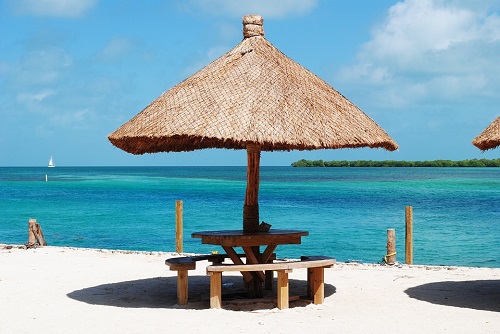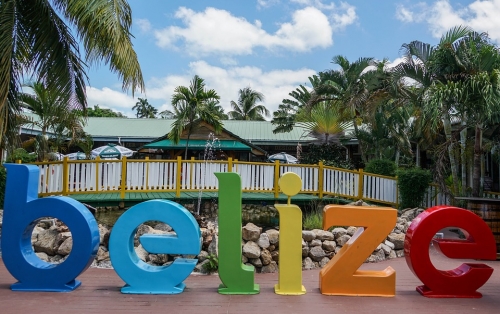A South American nation with English as its official language, Belize is different from its neighbors in many ways. This independent country offers its residents as well as visitors a tropical lifestyle, with a sunny climate, pristine beaches, a rich variety of flora and fauna, awe-inspiring scuba diving spots, fun water sports, historic archeological sites and ancient ruins. This place is ideal for those who are interested in nature as well as history, as even the urban cities boast lush nature and a colorful past.People of all nationalities feel at home since the local population, which comprises around 270,000 people, includes a blend of English, Creole, Chinese, Spanish and East Indian people. Belize’s multicultural nature makes sure that everyone experiences a sense of welcome. It is hard to find any evidence of religious or racial intolerance in the country. Thanks to its legacy of British rule, many of the social conventions, rules and regulations are similar to those of the United Kingdom.
While Belize is one of the top destinations for vacations, it has only just begun gaining popularity among expats who are looking for their next home. Up until recently, people from Europe and North America were more likely to settle down in Mexico, Guatemala, or Brazil. However, many of them, especially senior citizens, are now also open to the thought of moving to this South American country to enjoy their retirement. In such cases, it is essential for people to find out about the availability of doctors and medical facilities across the nation.
Healthcare in Belize
Unlike some of the other Central American nations, the healthcare system in Belize is still developing. You can choose between public and private care or opt for a combination of both. However, to an expat from a developed country, both may seem to fail to adequately address some of the more serious medical conditions.
Under the legislation of the Belizean government all residents, including foreigners, are entitled to receive free medical services from the state-run facilities. Since funding has always been a problem, patients may have to wait for a long time to get an appointment. The challenge is that the more modern and well-equipped facilities are located in the major cities, like Belize City. The quality of medical services in the rural areas is not as high. Emergency services too are limited to the urban areas. The authorities are quite open in acknowledging that it could take a couple of years before their nation’s medical services are at the same level as their neighbors.
Treatment of conditions like cancer is not only expensive but also not at a very high level, regardless of which sector you choose. There are neither any oncology residents in the country, nor facilities that can perform radiation therapy. Even a simple biopsy costs thousands of dollars and the samples have to be sent overseas for testing. Patients have to wait for at least 2 to 3 weeks to find out their test results. A Belizean-American Oncologist runs a small cancer treatment clinic in Dangriga and offers his services to those who cannot afford chemotherapy at other hospitals. However, for radiation all patients are required to travel to Guatemala.
The Public Healthcare System
Public Healthcare is controlled and funded by the Ministry of Health (MoH), a government agency responsible for the entire medical sector. It is also the largest public health service provider in the country. The objective of this entity is to offer affordable care to residents through a wide range of programs and institutions. However, while the system is available to the population of the whole nation, a large percentage of the funding has only been allocated to Belize City, where the national and regional referral hospital is located. Karl Heusner Memorial Hospital (KHMH) is regarded as the premier provider of public healthcare across the country. Lack of adequate funding has caused this facility to experience numerous challenges like shortage of medical supplies, outdated technology, malfunctioning equipment, and operation management problems.
Outside of Belize City, there are seven state-run hospitals, all located in the capitals of the other districts. Of these, three are regional hospitals:
• The Southern Regional Hospital in Dangriga
• The Northern Regional Hospital in Orange Walk Town
• The Western Regional Hospital in Belmopan, the nation’s capital
The 3 regional centers listed above provide more services to the general public than the capital hospitals in Toledo and Corozal.
Belize’s public healthcare system also has a network of around 60 state clinics that can accommodate 700 occupants or so. These are the primary source of medical and dental care services in the rural areas.

About 75% of the medical professionals in Belize are employed in the public healthcare sector but the shortage of qualified personnel continues to be a huge challenge. Most of the time there is only one physician available for every 1,000 patients. Hospitals are usually overflowing and waiting lines are long; it could take a patient days to get an appointment, even for some of the more basic conditions. Many of them have to travel to Belize City to just consult a doctor, as there is an uneven distribution of medical personnel.
While the doctors are quite well-qualified and experienced, they don’t always have access to the medical supplies that they may require. Outdated technology and equipment at many of the medical facilities cause further challenges in the proper treatment of patients. The local doctors can easily deal with minor ailments, even in the most remote areas. However, people suffering from serious problems often have to travel to facilities in the bigger cities or even abroad.
In 1990, the health authorities introduced a program through which psychiatric practitioners were integrated into state-run medical care services. Today, people all across the country have access to mental health services. A majority of the inpatient psychiatric consultations and treatments are provided at the Rockview Hospital, the national mental hospital located in the Central region. In the Western region, Belmopan Hospital also has an acute psychiatric ward that offers a variety of mental health services.
Each of the district hospitals have two psychiatric staff members to provide services related to mental health. The introduction of these practitioners in state-run hospitals has facilitated several improvements like a reduced number of admissions in psychiatric hospitals, increased outpatient services and the overall development of community-based mental health promotion programs. Psychotropic drugs can be purchased from any of the district hospitals or the polyclinic in Belize City. Unfortunately, their availability is intermittent and very often, patients are forced to make arrangements for their own medication.
Public Healthcare Eligibility and Costs
There is only one type of public insurance scheme in this country, which is through the Social Security Board (SSB). Anyone who lives and works in Belize is automatically eligible to access public healthcare, as long as they make the required contributions to the scheme.
All Belizeans are required to register under the SSB at birth. Foreigners also have to get themselves registered if they are trying to gain permanent residency, become citizens, or obtain a work permit.
For working expats, the employers and the employees are both required to make contributions to the scheme. Their medical expenses for all work-related conditions and injuries are then covered under Social Security. Other benefits related to illness, maternity and retirement are also provided, if the employee becomes unable to work.
State-run healthcare in Belize is low-cost or free and people do not require insurance to be able to afford the services of a doctor. A day’s stay in a hospital should cost approximately US $ 20 (£ 15.48, € 18.33) on average. However, this amount may be a bit higher, depending on the type of treatment a patient opts for. Surgeries and other complicated procedures cost no more than a few hundred dollars. However, patients get only basic services like shared wards and bathrooms. They need to arrange for their own towels, clothes and toiletries.
The Private Healthcare System and Network
Only about 25% of the country’s medical staff are employed by the private healthcare sector, and yet their services are far superior. However, the better quality comes at a much higher cost and the patients are expected to either pay for each service themselves, or make use of private health insurance cover. Only about 15% of the country’s population can therefore afford private healthcare. This includes most of the foreign nationals, as they prefer opting for private medical care.
A few decades ago, the government of Belize received some assistance from the United Nations and the European Union to restructure its healthcare system. In 1990, the private sector gained a lot of prominence in the service delivery of healthcare. Today, it provides additional tertiary care and imaging services that are not a part of the public system.
There are three main private hospitals that can be found in the country, with approximately 100 beds in total. These are:
• La Loma Luz Hospital: This private institution is run and managed by the Seventh Day Adventist mission
• Belize Medical Associates: A 25-bed private hospital offers neurological and radiology services
• Universal Health Services: A private healthcare facility that is located in Belize City
Not a lot of people are aware that Belize’s private healthcare sector has been divided into for-profit and non-profit facilities. La Loma Luz Hospital is one of the non-profit institutions. The country is also home to 50 other for-profit and 4 non-profit clinics. Both types of facilities offer prime services at comparably reasonable costs.

Often, there is an overlap between private and public healthcare. It is quite common for the state-run institutions to take the assistance of a private facility for a fee, when they lack specific equipment.
Public Health Insurance and Costs
The costs of private healthcare services are relatively higher and most patients therefore get an insurance policy to cover them for a major part of their medical expenses. Customers can choose from a wide variety of private insurance providers. It is best to get cover from a company within Belize, as international policies are not recognized by many of the local hospitals and clinics. All expats are therefore advised to sign up for private health insurance as soon as they move.
The cost of private treatment is bound to vary, depending on the type of facilities, the patient’s condition, the level of experience of the doctor, and the type of room the patient opts for. Patients could end up paying thousands of dollars even for a fairly simple procedure that requires them to stay in the hospital for a few nights. In most cases, they are likely to get private rooms along with a number of amenities.
Anyone in Belize can visit a private hospital or clinic, even if they do not have insurance. However, they will be liable to pay for each service.
Medical Tourism
The government of Belize had proposed the idea of developing the country as a center for medical tourism. The hospitals would then have to be equipped to deal with complicated procedures like heart surgery, angioplasty, joint replacement surgery, and pacemaker battery replacement. So far, these procedures are only carried out at the KHMH under the guidance and supervision of visiting specialists from the United States. Getting the other facilities trained and equipped to perform the same procedures will improve the system considerably, even for the locals. Unfortunately, critics claim that this scheme aims at making a profit from foreigners, instead of improving the level of healthcare for residents.
To make the transition from one country to the other smoother, all expats with pre-existing medical conditions are strongly urged to carry a letter from their physicians back home, describing their problem as well as a list of required medications.
Have you lived in Belize? Share your experience with other readers by filling in the questions here to be featured in an interview!

